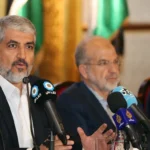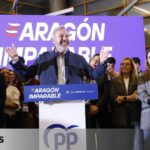
President Vladimir Putin has set a “red line” for the United States and its allies by indicating that Moscow may resort to nuclear weapons if they allow Ukraine to carry out deep strikes against Russia with long-range Western missiles.
However, some in the West question: did he really mean it?
This issue is crucial to the outcome of the war. If Putin is bluffing, as Ukraine and some of his supporters believe, the West may feel more comfortable stepping up military support for Kiev regardless of Moscow’s threats. If he is serious, there is a risk — already mentioned several times by Moscow and recognized by Washington — that the conflict will escalate into a Third World War.
In his most recent warning, Putin on Wednesday expanded the range of situations that could lead Russia to use nuclear weapons. He stated that this could occur in response to a major conventional attack involving aircraft, missiles or drones. If a rival nuclear power supports a country that attacks Russia, that power would be considered part of the attack.
These criteria apply directly to the situation that could occur if the West allowed Ukraine to attack Russian territory with long-range missiles such as the US ATACMS and the British Storm Shadow, something Putin mentioned as being dependent on Western support through satellites and target guidance.
“It was a clear message: ‘Don’t make mistakes — any such action could result in nuclear war,’” said Nikolai Sokov, a former Soviet and Russian diplomat.
Bahram Ghiassee, a nuclear analyst at the Henry Jackson Society think tank in London, linked the timing of Putin’s remarks to Ukraine’s lobbying for long-range missiles and President Volodymyr Zelenskiy’s attempt to reinforce his plea to U.S. President Joe Biden. , this week. “Putin is saying: stop this immediately,” commented Ghiassee.
“Nuclear blackmail”
Kiev’s response was swift, with Zelenskiy’s chief of staff accusing Putin of “nuclear blackmail.”
“In my opinion, this is yet another bluff and demonstrates Putin’s weakness. He will not dare to use nuclear weapons, as that would make him a complete pariah,” said Anton Gerashchenko, former advisor to Ukraine’s internal affairs minister, on X.
US Secretary of State Antony Blinken called Putin’s warning irresponsible and untimely, stating that it is not the first time that Putin has “brandished the nuclear saber”.
Andreas Umland, an analyst at the Swedish Institute of International Affairs, accused Putin of playing mind games. “This is a Kremlin PR psychological operation without much substance. It is designed to scare leaders and voters of countries that support Ukraine,” he wrote.
Fabian Hoffmann, a doctoral researcher and defense expert in Oslo, said that while Putin’s comments cannot be ignored, it is important not to overreact. “Russian nuclear use is not imminent,” he declared on X. “Concern is only justified when Russia signals real preparations.”
Hoffmann explained that the next steps could involve removing warheads from depots and combining them with launch vehicles for a tactical strike, before intensifying preparations for large-scale nuclear use, such as preparing silos and putting bombers on alert — moves that would be detected by US intelligence agencies.
Russia security expert Mark Galeotti wrote: “Talk is easy and has political impact, but there is no evidence of a real willingness to use nuclear weapons, and that would be something we could detect if it were happening.”
Lower threshold
Still, Putin was more specific than in the past about the circumstances that could lead to nuclear use. His spokesman said on Thursday that the comments were made as a clear signal to Western countries that there would be serious consequences if they participated in attacks on Russia.
The announced changes, however, did not meet the requests of some more aggressive commentators. The best-known of them, Sergei Karaganov, suggested a limited nuclear strike in Europe that would “bring sobriety” to Russia’s enemies, making them take the country’s nuclear deterrence seriously.
In practice, the changes extend Russia’s nuclear umbrella to cover neighboring Belarus, a close ally, and lower the threshold for nuclear use by declaring that it could occur in response to a conventional attack that posed a “critical threat.” to our sovereignty.” Previously, the nuclear doctrine mentioned a threat to the “existence of the State”.
Putin made the announcement in a four-minute video, in which he addressed the nine members of a security council that meets twice a year to discuss nuclear deterrence. He stated that the use of nuclear weapons is an extreme measure and that Russia has always treated the issue responsibly.
Ministers and intelligence chiefs listened intently, occasionally shuffling papers. Alexei Likhachev, head of the state nuclear energy corporation Rosatom, took detailed notes. But the real recipients of Putin’s message were in Kiev, Washington and London.
Yevgeny Minchenko, a Russian political consultant, said the essence of the revised doctrine was a clear message to Ukraine and the West not to further escalate the war in Russia. “If you try to kill us at the hands of your representatives, we will kill you and your representatives,” he said.
Sergei Markov, a former Kremlin adviser, said the changes open the door to Russia’s use of tactical nuclear weapons in certain scenarios, especially against Ukraine. “The threshold for the use of nuclear weapons has been lowered. Now it will be easier for Russia to use nuclear weapons,” Markov wrote on his official blog.
He suggested that Russia could use tactical nuclear weapons against Ukraine or air bases in Romania or Poland if Ukrainian planes flew from there to attack Moscow or other parts of central Russia, with support from US or UK satellites.
“No respect”
Igor Korotchenko, a military analyst often seen on state TV, said the changes were necessary as the West ignored a series of previous warnings against further escalation, including Russian exercises that simulated the use of tactical nuclear weapons. “We see that Western adversaries no longer respect any ‘red lines’, believing that any move to arm Ukraine and Western-assisted attacks inside Russian territory will not result in nuclear escalation,” he told the newspaper Izvestia.
Vladimir Avatkov, who is part of an official body that advises Putin on international relations, said announcing the changes in doctrine allowed Moscow to pre-empt Western decisions on sending missiles to Ukraine. “Let them think now,” he wrote on Telegram. “This is an attempt to not only warn them, but also to give them back the fear they have completely lost. And maybe even some strategic thinking.”
The changes were welcomed by Russian nationalists and war bloggers, some of whom have long called for Moscow to use nuclear weapons to force Ukraine’s capitulation. It also sparked discussions about what could trigger a nuclear response.
Dmitry Medvedev, deputy chairman of Russia’s Security Council and former president, warned that Putin’s words should serve as a clear warning to Ukraine and the West. “A simple change in the regulatory conditions for the use of nuclear components in our country could cool the spirits of adversaries who have not yet lost their sense of self-preservation,” he said in a statement.
“Like little children”
Sokov, the former Russian diplomat, said there is a palpable sense of frustration in Moscow that the West appears to ignore its many nuclear warnings. He mentioned that when Russia held three rounds of exercises this year simulating preparation for the launch of tactical nuclear missiles, there were complaints in the media and among experts that Western countries were not paying attention.
“So now they decided to boost the signal,” Sokov said. “Putin decided that the West is like little children, and you have to explain every single thing because they just don’t understand.”
Sokov expressed concern about the “trash talk” of politicians and commentators who argue that the West crossed several Russian red lines without punishment — such as sending tanks and F-16 fighter jets to Ukraine — which could lead to the conclusion that warnings from Moscow can be ignored.
In fact, he said, the West has not yet crossed two red lines clearly established by Russia: sending NATO troops to fight in Ukraine and allowing Ukraine to fire long-range Western missiles at Russia.
“How can we predict Putin’s reaction if so far we have not crossed any Russian red lines?” he said in a telephone interview, arguing that such an approach is based on assumptions, not data. “I’m really worried about all this nonsense, because we’re facing a completely unknown situation… If you ignore the risks, you could end up being surprised in a very unpleasant way.”
With information from Reuters*
Source: https://www.ocafezinho.com/2024/09/27/putin-endurece-discurso-e-usa-ameaca-nuclear-para-pressionar-o-ocidente/

